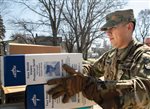Significant deployments ahead for Iowa National Guard
ESGR provides resources for employers, service members

JOE GARDYASZ Apr 30, 2020 | 8:19 pm
3 min read time
787 wordsRetail and Business, The Insider NotebookAs the wife of a now-retired career Iowa National Guard member, Rebecca Coady had for many years provided support to her husband while he was deployed overseas a number of times. It also led her to become involved with the Iowa Employer Support of the Guard and Reserve. For 11 years, she was employed as part of a small staff that supportd more than 100 volunteers with the ESGR program statewide.
Now, as a volunteer and the incoming chair of the Iowa ESGR, Coady is part of a team coordinating efforts to prepare employers across the state as the Iowa National Guard gears up for the biggest round of overseas deployments that Iowa units have had in nearly 10 years.
Beginning this month and ramping up through early 2021, more than 2,000 Iowa Guard members are expected to be deployed overseas in support of operations for three unified commands across the globe. That number represents nearly 30% of the Iowa Guard’s total personnel, the largest number deployed from Iowa at one time since 2011.
The Iowa Army National Guard has approximately 6,675 soldiers and the Iowa Air National Guard has roughly 1,930 airmen, for a total joint Iowa National Guard force of about 8,600 members between the two components.
A Department of Defense program, ESGR was established in 1972 to promote cooperation and understanding between reserve component service members and their civilian employers. A primary role of the ESGR is to ensure that employment rights are upheld under the Uniformed Services Employment and Reemployment Rights Act of 1994 (USERRA).
Over the past several years, deployments from Iowa units have been relatively light, which means that many employers, particularly smaller ones who may have one or two Guard members, may not yet have experienced a deployment, Coady said. The challenging economic times with the COVID-19 pandemic will likely mean some uncertainty for Guard members who are being deployed, she acknowledged.
“We potentially see a little bit of confusion on both sides when the service members give notice that [they’re being deployed] and now, all of a sudden they’re being told they’re furloughed or there’s no job available for them because [their civilian company] has gotten rid of the department or closed stores,” she said. “We have an ombudsman, and I’m guessing they may have to work through some of those issues.”
Among other things, under certain conditions, USERRA requires employers to put individuals back to work in their civilian jobs after military service. USERRA also protects service members from discrimination in the workplace based on their military service or affiliation.
The ESGR serves as a neutral, free service for both employers and service members and does not legally represent either side, Coady said. “If a case is brought to us, a lot of times it’s us representing both sides,” she said. “We have to maintain we are not pro- either side.”
Additionally, Iowa ESGR encourages service members to always try to work out issues with their employer directly, by providing specific information from the section of USERRA that pertains to their situation. “We always feel that’s the best place to start,” Coady said. “And then if they don’t get any headway that way, then obviously we’re going to advise them to file a formal case.”
The USERRA provisions apply only to federal activations of units, so ESGR directs
questions and issues related to activations by the governor to the Iowa National Guard’s Judge Advocate General’s Office.
Before the COVID-19 pandemic erupted, the Iowa ESGR had planned a series of outreach events across the state to prepare employers for this coming round of deployments — those have since been canceled. “Our intent was to have the unit or battalion commanders give a message about expectations, and then we would follow up with training on the law and answer questions from employers to help them with pre-deployment challenges,” Coady said.
Now, ESGR is working on alternative ways to get the message out, Coady said. For now, the Iowa ESGR website, which has an information tab for USERRA, provides the best source of information for employers, she said. The organization also posts information on its Facebook page. One of her first goals as she steps into the chairman role later this year is to launch an employer newsletter.
“Employers in Iowa generally want to do the right thing, and they do a fantastic job of supporting their military employees around our state,” Coady said. “A lot of times, the challenges that come up are simply because they don’t know what the law states or what the USERRA expectations are. We have great employers and business professionals that really understand the value of their military employees, and that definitely comes through.”










